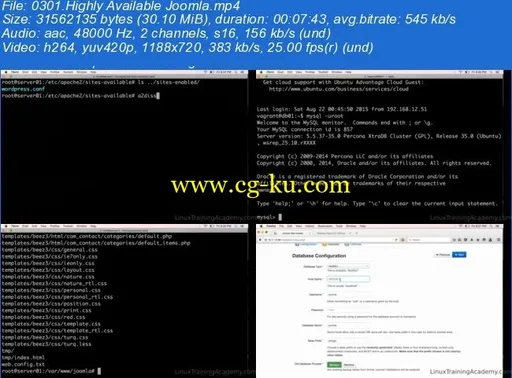 Duration: 1h 59 | Video: h264, 1188x1080 | Audio: AAC, 48kHz, 2 Ch | 461 MB
Duration: 1h 59 | Video: h264, 1188x1080 | Audio: AAC, 48kHz, 2 Ch | 461 MB
$178 | Genre: eLearning | Language: English | September 26, 2018
How to eliminate single points of failure & increase uptime for your Linux, Apache, MySQL, & PHP Based Web Sites & Apps.
Video Description
Do you wish you could ensure your website was up all the time and finally enjoy a peaceful night's sleep? Do you want to be able to scale without downtime and handle unexpected surges of traffic? Do you want a solution that just works without spending weeks testing various combinations of technologies and software? Do you want someone to lay it all out for you and walk you through an entire deployment? If so, you're in the right place. I understand because I've been there. I know what it's like to be woken up in the middle of the night when a web server goes down. I don't know about you, but I'm fairly grumpy at 2:47 A.M. when something is broke and I'm the one that has to fix it. That's why I strive to eliminate single points of failure and ensure service availability. I would much rather plan for failure ahead of time than have to react to it. If you have a robust design that's easy to support you can repair any failures at your convenience instead of trying to cobble together a makeshift solution in the middle of the night. I've spent countless hours designing, testing, and implementing high availability solutions for a wide range of Linux based services during my career. I've put together a well designed, well-tested solution for the LAMP (Linux, Apache, MySQL, PHP) stack that easily scales to support an increasing number of users all the while decreasing downtime. I've taken each possible single point of failure into account from the obvious ones to the less than obvious edge cases you'll need to cover in order to have a truly robust design. This architecture and design:
Works on physical servers. If you're running on bare metal, this design will work for you.
Works in virtual environments such as VMWare, VirtualBox, Ovirt, Red Hat Enterprise Virtualization (RHEV), KVM, and Xen.
Works in the cloud -- You'll learn about the important nuances for running in the cloud. This design works whether you're using Amazon Web Services (AWS), Rackspace Cloud, or another provider. Scales without downtime add more servers or resources without users even noticing. Works with custom written websites and applications that run on the LAMP stack. Supports popular open source web applications such as WordPress, Drupal, Joomla, MediaWiki, phpBB, Redmine, SugarCRM, and more.
Style and Approach
This step-by-step guide teaches you everything you need to know website eliminate single points of failure for your Linux, Apache, MySQL, and PHP based web applications.
Table of Contents
HIGH AVAILABILITY FOR THE LAMP STACK
SCALING
BONUS: HIGHLY AVAILABLE JOOMLA
What You Will Learn
Build and deploy a highly available LAMP stack.
Increase the uptime for your website and web applications!
Authors
Jason Cannon
Jason Cannon is a professional system administrator, consultant, and author. He started his career as a Unix and Linux System Engineer in 1999. Since that time he has utilized his Linux skills at companies such as Xerox, UPS, Hewlett-Packard, and Amazon.com. Additionally, he has acted as a technical consultant and independent contractor for small businesses and Fortune 500 companies. Jason has professional experience with CentOS, RedHat Enterprise Linux, SUSE Linux Enterprise Server, and Ubuntu. He has used several Linux distributions on personal projects including Debian, Slackware, CrunchBang, and others. In addition to Linux, Jason has experience supporting proprietary Unix operating systems including AIX, HP-UX, and Solaris. He enjoys teaching others how to use and exploit the power of the Linux operating system. He is also the author of the books "Linux for Beginners" and "Command Line Kung Fu."

Password/解压密码
-0daydown




发布日期: 2018-10-05